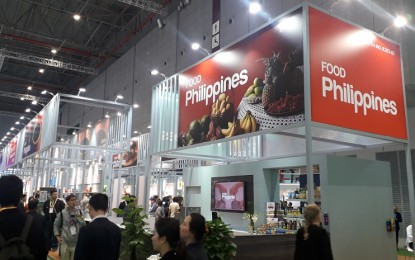
SHANGHAI, China — Filipino food manufacturers are participating in China’s biggest buying expo to seek opportunities in the world’s largest market.
More than 30 Filipino companies have been showcasing their products during the 2nd China International Import Expo (CIIE) at the National Exhibition and Convention Center here since November 5.
Filipino companies and organizations participating in this year’s CIIE include 22 Propack Asia Corp.; Agrinurture, Inc.; Benvelle Corp.; B-G Fruits & Nuts Mfg. Corp.; Century Pacific Food, Inc.; Eng Seng Food Products; Excellent Quality Goods Supply Co.; Filifresh International Trading; Fisher Farms, Inc.; Fruits of Life, Inc.; GSL Premium Food Export Corp.; Magicmelt Foods, Inc.; Magsasakang Progresibo Marketing Cooperative; Mancoco Food Processing, Inc.; Monde M.Y. San Corp.; and Monde Nissin Corp.
Pasciolco Agriventures; Pearl Foods International, Inc.; Phil. Morinda Citrifolia, Inc.; Philippine Franchise Association; Pixcel Transglobal Foods, Inc.; Primex Coco Products, Inc.; Roxas Sigma Agriventures, Inc.; Saw Fine Foods International Ltd.; San Miguel Foods; SEE’S International Food Mfg. Corp.; SL Agrifood/Agritech Corp.; Team Asia Corp.; Trans Ocean Food Products, Inc.; Tropicana Food Products, Inc.; and W.L. Food Products also joined the buying expo.
The country’s food pavilion at the CIIE focuses on promoting healthier and more organic products amid the growing demand for health and wellness products in China.
In his visit to Shanghai last Tuesday, Department of Trade and Industry (DTI) Secretary Ramon Lopez said the Philippines needs to ramp up its manufacturing capacity if enterprises would like to tap the huge Chinese market.
“Now it’s up to us to have the domestic production capacity to be able to supply the requirements because we all know China is a big population — 1.4 billion — so when they order, the demand is always in big quantity,” Lopez said.
While improving exports to China, the trade chief said the Philippine government targets to attract more investments from Chinese businesses to set up their production facilities in the country.
“Since we lack the capacity, why not invest in the Philippines and produce that capacity,” Lopez said.
“That’s why we encourage companies to establish operations in the Philippines – iron and steel, metals, chemicals, auto parts, energy, infrastructure. It has an import substitution effect also. It will reduce our importation, at the same time there are other products that we can export to anywhere,” he said.